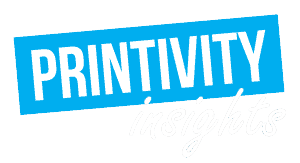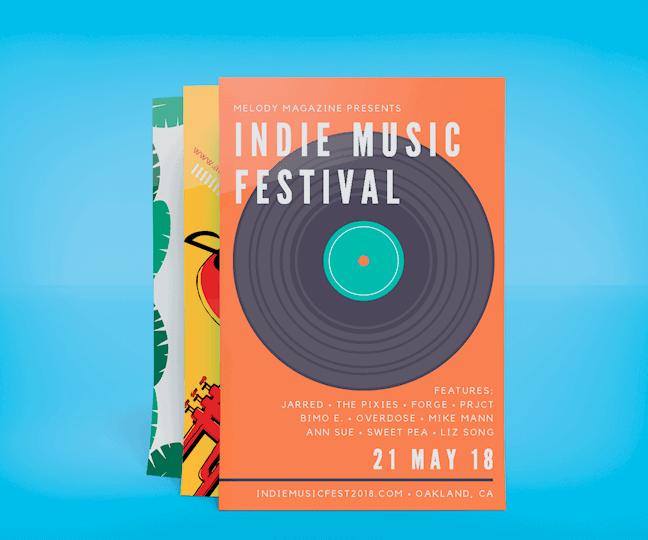Last updated on August 6th, 2024 at 01:35 pm
Posters can be used to promote a diverse range of events and activities— from blockbuster movies to live music performances, product launches and more. Plus, they can be pinned almost anywhere pedestrians go, making them both convenient and effective.
The best poster design is one that is eye-catching, succinct, and compelling. Ultimately, it’s a piece of art that generates a desired response.
If your company’s idea of poster design still involves Microsoft Word templates or clipart, the marketing materials you are producing are pretty much guaranteed to be less than ideal. But what’s even worse is that even companies who spend considerable chunks of cash hiring design agencies or investing in layout programs aren’t immune to bad poster designs. Sometimes, a mistake still makes it to the printing stage, or a “professional” designer commits a graphic faux pas.
So, what’s the solution?
We recommend learning to design your own poster using industry best practices and techniques. This way, whether you complete the entire project yourself or hand it off to someone else, you’ll know how to spot an impeccable promotional or event poster when you see one.

Before You Create Your Design: Know Your Audience
The first step of learning how to design a poster is to know exactly who your poster is for. You can create the most visually-appealing poster in the world, but if it doesn’t appeal to the people you are trying to captivate, well, it’ll be equivalent to showing the Mona Lisa to a classroom full of toddlers.
For example, if you want to create a poster for an upcoming death metal concert, the way you design that poster is going to be the opposite extreme of how you’d design a poster for a major retail outlet that’s having a sale on baby diapers. For the first design, you’d be targeting men (one study found that 81 percent of heavy metal concert-goers are men) between the ages of 18 and 40. You’d also likely use colors like jet black and fire red, and aggressive, gothic-inspired fonts.
For the diaper sale, however, you’d be targeting women between the ages of 18-40, and would likely use pastel colors with soft, round fonts and images of infants.
Moral of the story? Always ask yourself who your target audience is and do a little research before starting your design.
Before You Create Your Design: Know Your Brand

The best poster designs appeal to your ideal customer while simultaneously conveying your brand in a distinct and compelling way.
Why worry about branding? One study found that consistent brand presentation can be linked to a 23 percent revenue increase, for starters. Additionally, visual branding is the quickest way to make your business memorable in the mind of your ideal customer since humans process visuals 60,000 times faster than text.
This is why it is so crucial for businesses to establish their visual style guide as soon as possible and have all of the elements in place, including a brand color palette, a font pack, rules for logo use, and key messages that can be used in marketing materials.
Before Creating Your Design: Know Your Goal
You’re almost ready to get started on your poster layout design. All that’s left to do is determine what the main objective of your poster will be. Are you creating an event poster and trying to get people to buy tickets? Tune in to a local radio station? Buy your brand of hair care products? Whatever your end goal is, make sure to be very clear and provide the viewer with the simplest way to complete the action.
For example, if you want people to volunteer at an upcoming holiday donation drive, providing the contact information to reach your volunteer coordinator directly would be ideal. Putting a general phone number could lead to people being placed on hold for longer periods of time or being misdirected to the wrong contact.
The more obvious you can make your call-to-action, and the less difficult you make it for people to complete it, the greater the response will be.
Design Tips: Typography
This is one of the most essential parts of knowing how to design a poster. The typography you select for your poster will have a major impact on how your audience reacts to it. For instance, thin, minimalistic Sans-Serif fonts tend to evoke a sense of calm and cleanliness. Big-league brands like Apple and LG use these fonts to give their marketing materials an airy, polished, and modern appeal.

On the other hand, Serif fonts, which have a more traditional, charming appearance are used by highly-esteemed brands like Time Magazine and Tiffany & Co. to give their trademarks a classic, refined presentation.
Alternatively, brands geared towards women tend to use flowing, swirly calligraphy fonts like Alex Brush or Allura, while those geared towards men use sturdier, bold fonts like Brothers or Bank Gothic.
We recommend you design custom posters using a couple of fonts you like and then conduct a poll with employees or others who are similar to your target audience. This will help you gauge which version your audience will respond to best.
Design Tips: Color
Did you know there is an entire field of study dedicated to how colors impact human emotions and behavior? It’s true. The colors we see can change the course of our thoughts. This is why no business should set out to design a poster without understanding the importance of color as it relates to marketing.
Below are a few key color psychology tips to remember:
- Red is associated with feelings of strength, urgency, excitement, and hunger.
- Blue is associated with feelings of trust, wisdom, and joy.
- Yellow is linked to feelings of enthusiasm, positivity, spontaneity, and alertness.
- Green conveys a sense of safety, stability, reliability, and wholesomeness.
- Purple is associated with imagination, sensitivity, spirituality, and mystery.
One of our favourite poster design tips when working with colors is to use contrast to emphasize important visual elements. The more high-contrast something is, the more dark colors are being used with light colors. An example of this would be using a light pink font on a pure-black background. The contrast between these two hues would make the pink text pop.
Design Tips: Style
Every good poster design has a unique, attractive, and creative edge that distinguishes it from other promotional materials. While style can be a little bit harder to define than colors or fonts, there are some discernible types if you know what to look for.
Minimalism, for example, is a kind of style. Minimalist graphic design features an ample amount of white space, a restricted or monochromatic color palette, and a bare minimum number of elements.
If you’re not sure which style best suits your business or project, we recommend researching these popular aesthetics:
- Retro
- Luxury
- Abstract
- Geometric
- Vintage
- Photorealism
- Art Deco
Many design professionals combine elements from various styles when creating their print materials. When deciding how to design a poster that aligns with your brand and vision, it’s all about experimenting with aesthetics.
Ideas for Using Printivity Custom Posters, Banners and Mini Posters
At Printivity, our goal is to help business owners create and order exceptional, professional-grade marketing materials with our user-friendly, hassle-free online printing platform. All of our poster templates are downloadable and can be edited in Photoshop or InDesign— meaning you get a fully-customized final product.
When using our custom poster printing templates, you start with a template but you are the poster maker. You can play with visual design elements, add your own JPG images, illustrations, or icons. When printing your custom posters, you can choose between a gloss or matte finish.
If you’re looking for something bigger and bolder, we recommend considering our vinyl banners. They are heavy-duty and ideal for outdoor use. Reinforced nickel-plated grommets make sure your banner withstands extreme weather, and the option for heat-welded hemming reduces the likelihood of fraying or unraveling. You can also get creative with a vertical design, or a banner, that splits one image across multiple panels, similar to this.
Lastly, our mini posters are ideal for businesses who want to physically hand-out materials to pedestrians (they’re more durable than flyers and less susceptible to weather damage), or who need an eye-catching product that can fit on a telephone pole or stand out on a crowded bulletin board. Our custom mini posters can be made with uncoated, matte, or gloss finishes, and are ideal for creating poster sets that share a design style but work together for a common marketing goal, like this set of European tourism signs.
Are You Ready to Produce Marketing Materials That Pop?
With Printivity, your materials will stand out, connect, and stay remembered. Contact us today or start your first project online and discover why 35,000+ customers trust us with their print marketing needs.
Don’t have time for to design? Printivity has you covered! We are offer graphic design services to help you get your designs ready and printed quickly!




